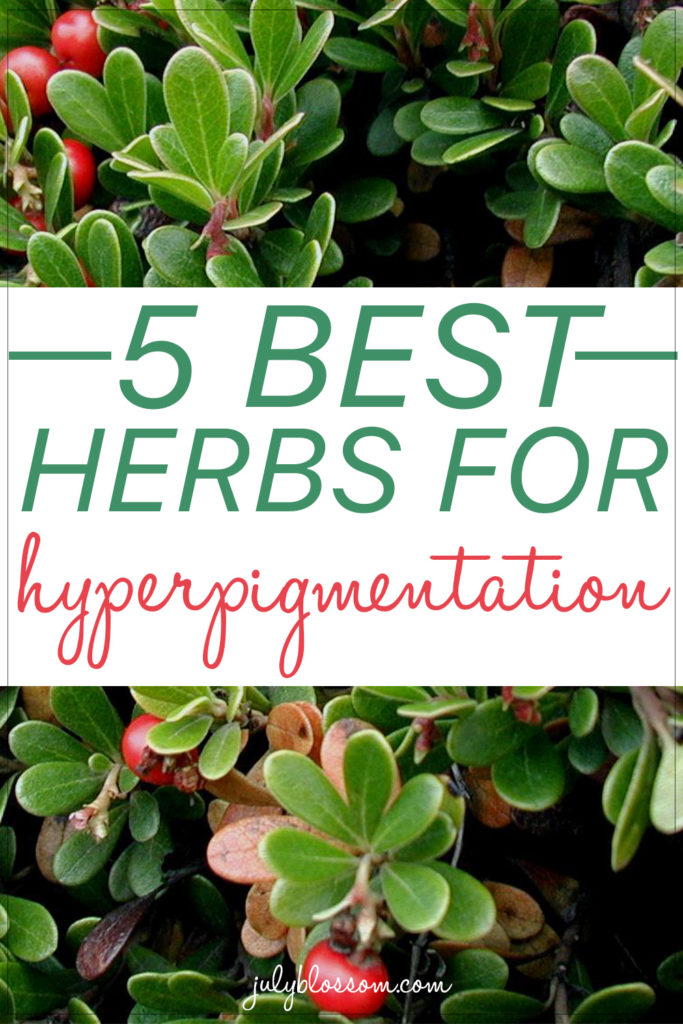Hyperpigmentation is common but can be aesthetically unappealing to some people. If you have it and want it gone, don’t worry – there is a good range of ingredients from Nature that can be used to reduce its appearance. Uncover the top herbs for hyperpigmentation in this article.
What is Hyperpigmentation?
Hyperpigmenation is a skin condition that causes certain areas of the skin on your face or body to darken. This leaves you with dark patches such as around the mouth, eyes and other areas.
Most of the time, hyperpigmentation can be natural especially having darker inner thighs, darker underarms, darker knees and so on.
But hyperpigmentation is also caused by several other factors such as certain medications, acne, oxidative stress and too much sun exposure.
These factors elevate inflammatory mediators in the body, stimulating melanogenesis, the production of melanin – the natural skin color pigment.
Standard conventional treatments for hyperpigmentation often use hydroquinone, a substance whose use has been linked to various adverse effects including contact dermatitis, skin irritation and toxicity.
Using herbs for hyperpigmentation has been shown by research to be effective and have little to no side effects with long-term exposure, compared to synthetic treatments.
Below, let’s explore the best herbs for hyperpigmentation for a more even skin tone:
Top 5 Herbs for Hyperpigmentation

1. Licorice root extract
One of the best herbs for hyperpigmentation is licorice root extract.
Licorice extracts have many active chemical compounds that stimulate or suppress melanogenesis.
The main active compound in licorice is glabridin, which improves hyperpigmentation by dispersing melanin and inhibition of melanin biosynthesis.
This study shows that glabridin prevents Ultraviolet B (UVB) induced pigmentation and exerts anti-inflammatory effects.
Another piece of research shows that other active licorice compounds, such as glabrene, isoliquiritigenin licuraside, isoliquiritin, and licochalcone A, inhibited tyrosinase activity, which in turn inhibit the production of dark spots.
Liquiritin is another ingredient in licorice that helps to disperse and remove existing melanin in the skin
This research shows that applying a cream with 20% liquiritin for 4 weeks is therapeutically effective in melasma (a type of hyperpigmentation).
My best ever product that I’ve found to actually help reduce hyperpigmentation is Eminence Bright Skin Licorice Root Exfoliating Peel. It contains licorice root, tea tree as well as a natural hydroquinone alternative from African potato. For best results, use it once or twice a week on your problematic areas to achieve an even skin tone!
2. Mulberry extract
Mulberry extract is a herbal alternative to harsh hyperpigmentation treatments containing hydroquinone and mercury.
It is known for its amazing skin brightening properties that help fade dark spots, pigmentation and aging marks.
According to research, mulberry extract is a natural inhibitor of tyrosinase, the active enzyme that triggers the production of melanin.
Using mulberry extract helps slow down the production of melanin which prevents new areas of hyperpigmentation from forming and becoming visible on the uppermost layer of the skin.
You can try this Dark Spot Remоver Cream with hyaluronic acid and mulberry extract. it is formulated for reducing hyperpigmentation on your face and sensitive areas like the bikini area, inner thighs and underarms.
3. Bearberry extract
Research shows that bearberry extract is also good for hyperpigmentation.
This botanical extract contains a hefty amount of Arbutin, a natural tyrosinase inhibitor.
Bearberry is well known for its skin brightening properties.
It is a natural herb that is known to inhibit melanin, prevent hyperpigmentation and protect the skin from long term effects of oxidative damage from sunlight.
This product from QRxLabs: Lactic Acid 50% Gel Peel with Kojic Acid and Bearberry & Licorice Root Extracts is a professional grade chemical peel. It contains many depigmenting ingredients like kojic acid, licorice extract, bearberry extract, green tea extract, chamomile extract and more.
It is effective to be used once a week to help fade away dark spots on your skin faster. A little goes a long way with this chemical peel so don’t over use!
4. Ginseng
The main pigmentation-reducing component in ginseng is P-coumaric acid, whose depigmenting mechanism is through reducing L-tyrosine oxidation.
This effect is shown to significantly suppress melanogenesis, according to this study.
Several other studies such as this one and this one show that ginseng is a powerful herb for hyperpigmentation with its natural skin lightening action.
I really love this simple yet effective bottle of Ginseng Skin Oil pills from Easy Comforts. They are for EXTERNAL use. Just test open a capsule and apply on hyperpigmentation areas.
Also, taking ginseng internally can help with hyperpigmentation as well as thwart pesky free radicals that cause oxidative damage. Get yourself NutraChamp Korean Red Panax Ginseng Supplements.
Now if you’re a fan of Korean skin care (K-Beauty), then this Ginseng Face Toner by Sea Dam Han may tickle your fancy.
5. Aloe Vera
Last but not least in this list of top herbs for hyperpigmentation is aloe vera extract.
According to a 2013 study published in the Journal of Cutaneousand Aesthetic Surgery, the leaf of aloe vera extract and its active ingredient aloesin, induced powerful, dose-dependent, physiologically significant melanin aggregating effects leading to skin lightening via adrenergic receptor stimulation.
Another study showed that aloesin reduced perpigmentation by 34%.
There are many good brands of Aloe vera gel you can use such as Lily of the Desert, NaturSense, Fruit of the Earth and more. But upto today, I think Amara Beauty Organic Cold-Pressed Aloe vera Gel is my best.
Other Herbs for Hyperpigmentation
- Gingko biloba extract
- Cinnamon
- Green tea extract
Are you interested in using herbs for hyperpigmentation? I hope this article has helped you! Share your thoughts in the comments below.






Leave a Reply